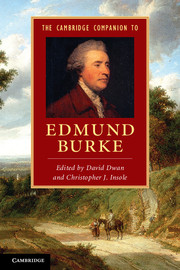Book contents
- Frontmatter
- Contents
- Contributors
- Acknowledgements
- Method of Citation
- Chronology
- Introduction Philosophy in Action
- 1 Burke’s Life
- 2 Burke, Enlightenment and Romanticism
- 3 Burke as Rhetorician and Orator
- 4 Burke’s Aesthetic Psychology
- 5 Burke on Law and Legal Theory
- 6 Burke on Political Economy
- 7 Burke and Religion
- 8 Burke and the Constitution
- 9 Burke and the Natural Law
- 10 Burke and Utility
- 11 Burke and the Ends of Empire
- 12 Burke and the American Crisis
- 13 Burke on India
- 14 Burke and Ireland
- 15 Reflections on the Revolution in France
- 16 Burke’s Counter-Revolutionary Writings
- 17 Burke in the United States
- Further Reading
- Index
- References
3 - Burke as Rhetorician and Orator
Published online by Cambridge University Press: 05 December 2012
- Frontmatter
- Contents
- Contributors
- Acknowledgements
- Method of Citation
- Chronology
- Introduction Philosophy in Action
- 1 Burke’s Life
- 2 Burke, Enlightenment and Romanticism
- 3 Burke as Rhetorician and Orator
- 4 Burke’s Aesthetic Psychology
- 5 Burke on Law and Legal Theory
- 6 Burke on Political Economy
- 7 Burke and Religion
- 8 Burke and the Constitution
- 9 Burke and the Natural Law
- 10 Burke and Utility
- 11 Burke and the Ends of Empire
- 12 Burke and the American Crisis
- 13 Burke on India
- 14 Burke and Ireland
- 15 Reflections on the Revolution in France
- 16 Burke’s Counter-Revolutionary Writings
- 17 Burke in the United States
- Further Reading
- Index
- References
Summary
‘Reasonable beings are not solely reasonable’.
(James Boswell, 7 April 1773)When Thomas Pitt was an undergraduate at Cambridge in the 1750s, he received a series of letters of advice from his uncle William, at the time the dominant speaker in the House of Commons. The orator left him in no doubt about the direction his studies should take: ‘You are to be a gentleman of such learning and qualifications as may distinguish you in the service of your country hereafter; not a pedant, who reads only to be called learned, instead of considering learning as an instrument only for action.’ As the Elder Pitt, a competent classicist, must have known, the idea that learning should be valued primarily as ‘an instrument for action’ was a commonplace of Roman thought. It was expressed most completely in the figure of the orator who brings speculative knowledge to bear upon public causes and questions. In the eighteenth century, that idea still meant something to the educated elite. It informs Burke’s conception of public life and of the politician as a philosopher in action.
Speech was to be at the centre of Burke’s activities for much of his political life. Although he enjoyed the conventional education of the Irish professional classes, his education as an orator was in an important sense self-made. Lacking serious wealth and influence, young Irishmen of his rank knew that without rhetorical skills they would find it difficult to rise in the world. Many looked to Trinity College, Dublin to prepare them for their entry into public life. By all accounts the classical curriculum at Trinity, where Burke matriculated in 1744, was thoroughly taught, and he was able to extend the knowledge of the rhetorical canon he had already gained at Abraham Shackleton’s school in Ballitore. Yet we know from his early correspondence that he was frustrated by the rigidity of Trinity’s methods of instruction and stifled by its insistence on the study of scholastic logic. In the end, his extra-curricular activities as a youthful speaker in Dublin may have taught him more about the business of persuasion than anything he heard within Trinity’s walls.
- Type
- Chapter
- Information
- The Cambridge Companion to Edmund Burke , pp. 41 - 52Publisher: Cambridge University PressPrint publication year: 2012
References
- 1
- Cited by

